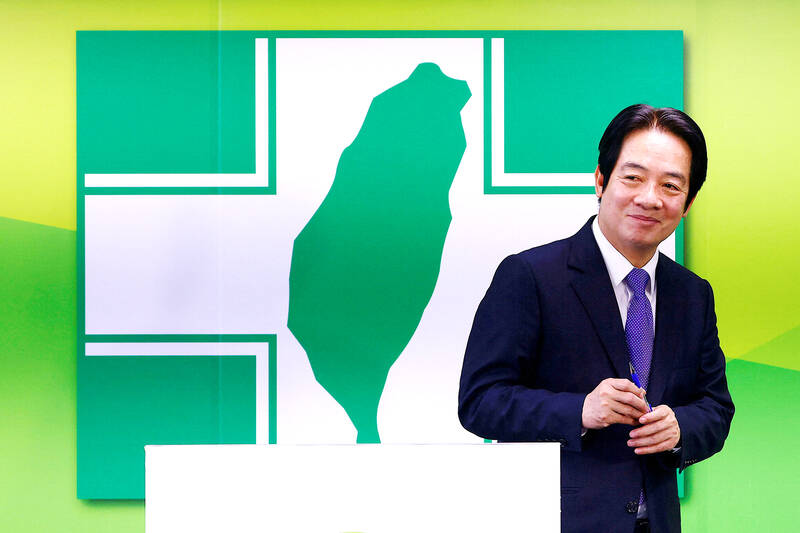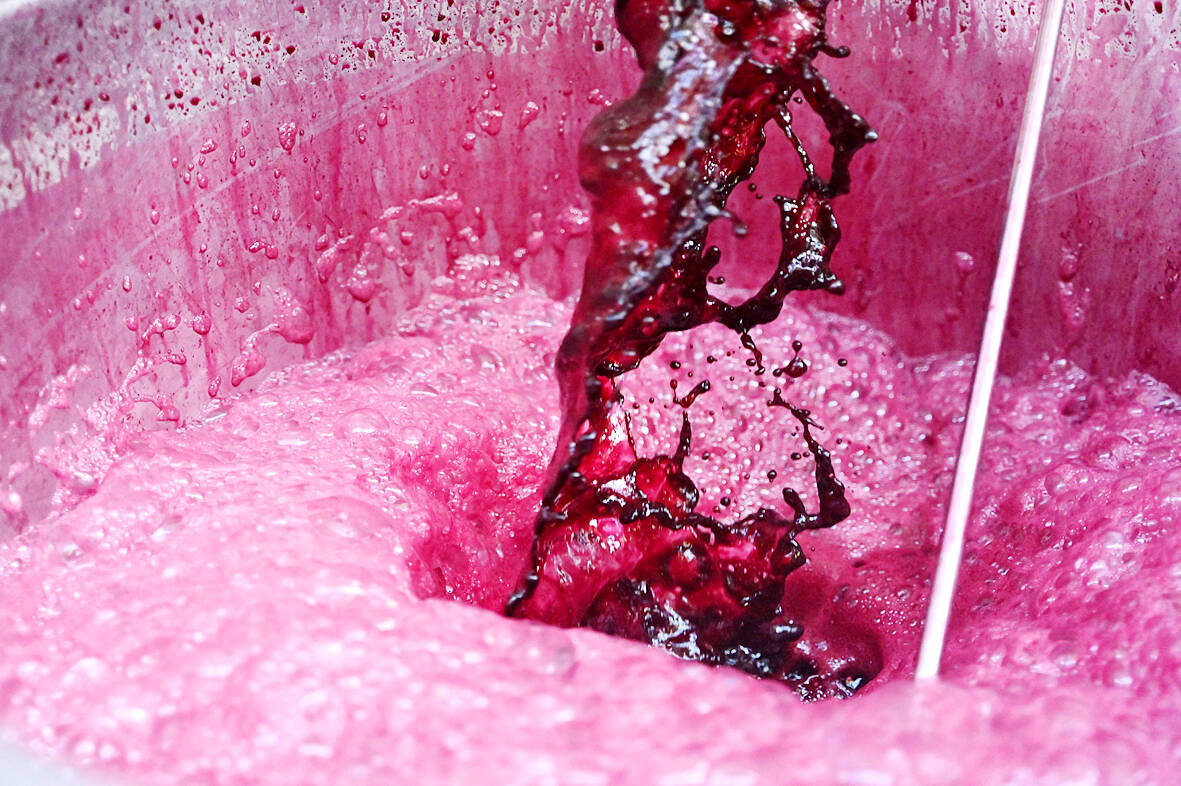Earlier this month, Vice President William Lai (賴清德) was elected unopposed to the chairmanship of the Democratic Progressive Party (DPP). As the chair, Lai is now the presumptive presidential candidate for next year’s election. Even as he became chairman, the global media was sending out signals about the coming fight we face to redefine Lai.
As he accepted his new role, he made a statement on independence. He said that he “pragmatically considers Taiwan as already a sovereign, independent country, therefore there is no need for a separate declaration of Taiwanese independence.”
This calm statement, DPP boilerplate now for over two decades, was no different than any that current President Tsai Ing-wen (蔡英文) has made.

Photo: Reuters
For example, after winning the election in 2020, in an interview with the BBC Tsai observed: “We don’t have a need to declare ourselves an independent state. We are an independent country already and we call ourselves the Republic of China, Taiwan.”
Clearly Lai is positioning himself as a mainstream candidate offering a position on the status of Taiwan with broad appeal inside and outside Taiwan. In fact his position is boring. It’s been that way for years.
Lai sometimes refers to himself as a “political worker” for Taiwan independence. In 2018 he had a roundtable in which he described what that meant. He laid out three tenets for that.

Photo: AFP
First, Taiwan is already a sovereign, independent state, so no need to declare independence. Second, only Taiwan’s 23.5 million people can decide its fate. Third, Taiwan must be promoted and cared for so that it garners the support of its people.
MAINSTREAM POLITICIAN
Lai’s positions on these milquetoast and mainstream ideas are easily found on the Internet. Yet there was the Financial Times on Jan. 16 shrilling that “Taiwan presidential contender sparks US concerns over China tensions,” (Kathrin Hille, Jan. 16) as if nothing had happened in China-Taiwan-US relations since Chen Shui-bian (陳水扁) was president. Hille, who is a wonderful journalist, probably didn’t write that malign clickbait headline.

Photo: AFP
The headline itself is an old trope of early 2000s vintage, under which the Taiwan side is held to account for China’s desire to annex it, and is blamed for the possibility of tensions rising.
The main text of the article, thankfully, explains that this position is not held by anyone who actually understands Taiwan, and quotes longtime Taiwan expert and US-Taiwan Business Council head Rupert Hammond-Chambers to good effect. But the Financial Times piece is one signal of how the chattering classes are going to treat Lai: guilty, and unable to ever prove innocent.
The clickbait usefulness of the “Lai as independence nut!” has long been out there. In 2017 when Lai was appointed premier, there were several pieces offering takes similar to this South China Morning Post gem: “The appointment of William Lai ... as Taiwan’s new premier has raised concerns over the future of cross-strait relations, given his tough, pro-independence stance and strong man image” (Will Taiwan’s new, hardline premier mean choppier waters for cross-strait relations? Lawrence Chung, Sept. 6, 2017).
The premier has little if any discernible influence on foreign policy, but that did not stop the writer, a longtime journalist here, from reaching for that clickbait.
Similarly, in 2019, when Lai ran against Tsai in the DPP primary, we saw another round of this.
“Taiwan’s presidential primary pits Tsai against China hardliner” Asian Nikkei told us (Kensaku Ihara, June 12, 2019). Yet anyone following the primary in Taiwan could easily see that Lai followed the DPP line and did not differentiate himself meaningfully on the independence issue. Lai knows perfectly well that anyone who becomes the president must govern from the center where Taiwan’s already-independent state is a mainstream view.
We are certain to see more portrayals of Lai as a hardliner, even (perhaps especially) from people who should know better, as we have seen for the last three years.
FETISHIZING THE ‘I’ WORD
There are two worrisome issues here. The first is the vast ignorance about Taiwan, even among people who write about it.
On Twitter, a novelist who has written a (very good) thriller about a Taiwan war highlighted one of Lai’s posts of his utterly banal views, saying that Lai’s remarks were a “moment of the day” right out of his novel, adding in a follow-on tweet: “Look man, we will give you all the weapons and ammo you need. Just don’t say the ‘I’ word at least until after we give it to you ffs.”
In reality, we’ve been saying the “I” word for 25 years. It’s just that people aren’t listening to how it is said or bothering to understand why it is said the way it is.
These attitudes are widely held. Similarly a defense analyst who works on Chinese People’s Liberation Army (PLA) development and Taiwan security issues, said “Strong statements on his first day!”
Does Taiwan need to do more explaining? It’s been explained often enough.
Despite there being no way that any elected government of Taiwan could “declare independence” (who could make such a declaration? How would it be approved? By what process? Popular referendum? The law bans referendums on the nation’s status), the rather stupid idea that Taiwan could declare independence and plunge the region into war at any moment retains a grip on many minds outside the nation.
It is strange to regard the Taiwanese, who are a conservative people addicted to the status quo in the way the rat in the famous experiment pulling on a bar repeatedly to get cocaine is addicted, as having the potential to roll out of bed one morning and declare independence. That means getting out of bed early, for one thing.
The idea that Taiwan is full of crazy independence buccaneers restrained by Washington makes a nice psychological balancing to the idea that China could invade, supports plenty of both-sidesism, makes the Taiwan issue neat and easy to understand and, of course, makes people inside the Beltway feel like they are being useful. It enables people to blame Taiwan for being threatened.
It’s just not true, though.
The scary part is that the US “concerns” in the Financial Times piece appear to be held by people with anti-Taiwan axes to grind. In the coming election period, assuming that Lai is the candidate, we are going to see piles of these pieces coming out from authors with ties to thinktanks that China funds.
Gird thy loins! The fight is just beginning.
Notes from Central Taiwan is a column written by long-term resident Michael Turton, who provides incisive commentary informed by three decades of living in and writing about his adoptive country. The views expressed here are his own.

Jacques Poissant’s suffering stopped the day he asked his daughter if it would be “cowardly to ask to be helped to die.” The retired Canadian insurance adviser was 93, and “was wasting away” after a long battle with prostate cancer. “He no longer had any zest for life,” Josee Poissant said. Last year her mother made the same choice at 96 when she realized she would not be getting out of hospital. She died surrounded by her children and their partners listening to the music she loved. “She was at peace. She sang until she went to sleep.” Josee Poissant remembers it as a beautiful

Before the last section of the round-the-island railway was electrified, one old blue train still chugged back and forth between Pingtung County’s Fangliao (枋寮) and Taitung (台東) stations once a day. It was so slow, was so hot (it had no air conditioning) and covered such a short distance, that the low fare still failed to attract many riders. This relic of the past was finally retired when the South Link Line was fully electrified on Dec. 23, 2020. A wave of nostalgia surrounded the termination of the Ordinary Train service, as these train carriages had been in use for decades

Lori Sepich smoked for years and sometimes skipped taking her blood pressure medicine. But she never thought she’d have a heart attack. The possibility “just wasn’t registering with me,” said the 64-year-old from Memphis, Tennessee, who suffered two of them 13 years apart. She’s far from alone. More than 60 million women in the US live with cardiovascular disease, which includes heart disease as well as stroke, heart failure and atrial fibrillation. And despite the myth that heart attacks mostly strike men, women are vulnerable too. Overall in the US, 1 in 5 women dies of cardiovascular disease each year, 37,000 of them

Politically charged thriller One Battle After Another won six prizes, including best picture, at the British Academy Film Awards on Sunday, building momentum ahead of Hollywood’s Academy Awards next month. Blues-steeped vampire epic Sinners and gothic horror story Frankenstein won three awards each, while Shakespearean family tragedy Hamnet won two including best British film. One Battle After Another, Paul Thomas Anderson’s explosive film about a group of revolutionaries in chaotic conflict with the state, won awards for directing, adapted screenplay, cinematography and editing, as well as for Sean Penn’s supporting performance as an obsessed military officer. “This is very overwhelming and wonderful,” Anderson